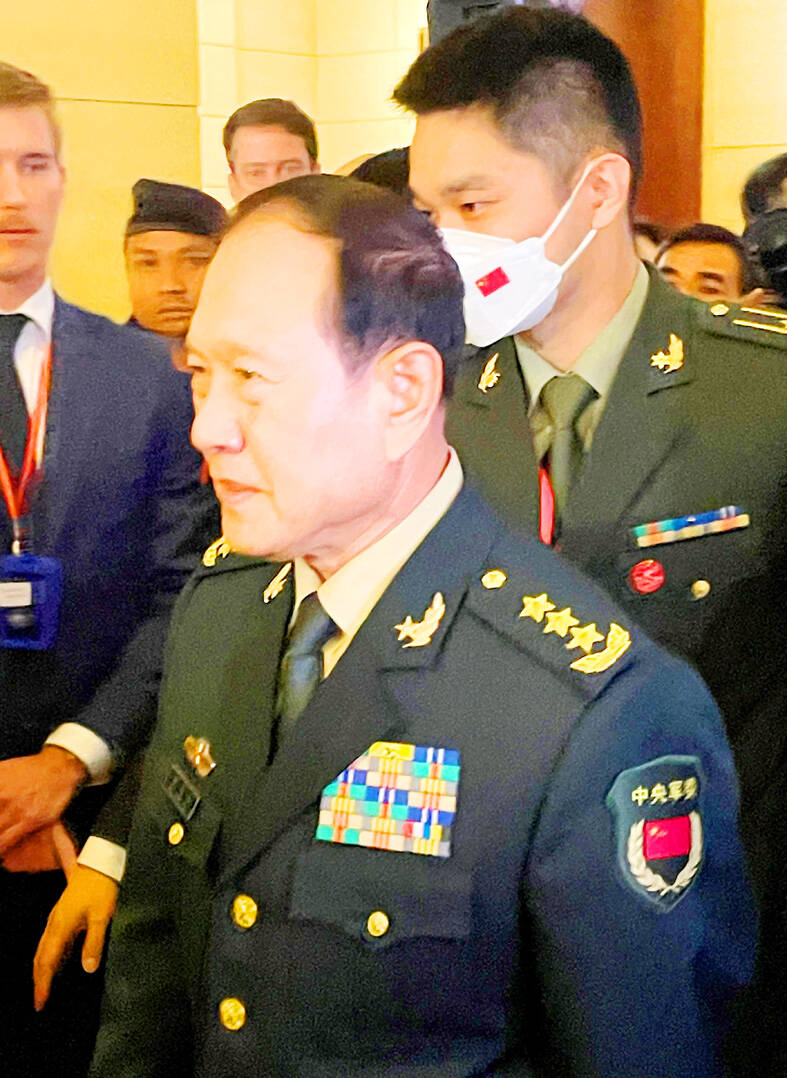The US’ and China’s top defense officials yesterday held talks on the sidelines of a regional meeting in Cambodia to discuss strained bilateral relations, and regional and global security issues.
It was the second face-to-face meeting in six months between US Secretary of Defense Lloyd Austin and Chinese Minister of National Defense General Wei Fenghe (魏鳳和).
Pentagon Press Secretary Brigadier General Pat Ryder said that Austin assured Wei of US President Joe Biden’s commitment to the “one China” policy.

Photo: AFP
Austin “underscored his opposition to unilateral changes to the status quo” in the Taiwan Strait and called on China to refrain from destabilizing actions toward Taiwan, Ryder said in a statement.
He also urged continuing talks on “reducing strategic risk, improving crisis communications, and enhancing operational safety,” noting concerns about “dangerous behavior” by Chinese military aircraft “that increases the risk of an accident,” Ryder said.
At a news conference, Chinese defense ministry spokesman Senior Colonel Tan Kefei (譚克非) described the talks “as a concrete measure to implement the important consensus reached between [Chinese President] Xi [Jinping, 習近平] and Biden.”
The meeting was “of great significance” for bringing China-US relations “back to the track of healthy and stable development,” Tan said.
However, a statement issued by the ministry quoted Wei as saying: “The responsibility for the current situation facing China-US relations is on the US side, not on the Chinese side.”
Wei said the issue of Taiwan was a “red line” over which China would brook no foreign interference.
China’s military “has the backbone, the determination, the confidence and the ability to resolutely safeguard the unity of the motherland,” Wei said.
The ministry’s statement said that the two officials also exchanged views on the South China Sea, Ukraine and the Korean Peninsula, without giving details.
The US statement said that Austin discussed Russia’s war in Ukraine, and noted that Washington and Beijing “oppose the use of nuclear weapons or threats to use them.”
The meeting came just over a week after a meeting in Indonesia between Biden and Xi, which was widely seen as an effort to ease tensions between the two superpowers over trade and China’s actions in the Taiwan Strait.
Austin and Wei were in Siem Reap, Cambodia, attending a meeting of APEC and other defense ministers.

Taiwan is projected to lose a working-age population of about 6.67 million people in two waves of retirement in the coming years, as the nation confronts accelerating demographic decline and a shortage of younger workers to take their place, the Ministry of the Interior said. Taiwan experienced its largest baby boom between 1958 and 1966, when the population grew by 3.78 million, followed by a second surge of 2.89 million between 1976 and 1982, ministry data showed. In 2023, the first of those baby boom generations — those born in the late 1950s and early 1960s — began to enter retirement, triggering

ECONOMIC BOOST: Should the more than 23 million people eligible for the NT$10,000 handouts spend them the same way as in 2023, GDP could rise 0.5 percent, an official said Universal cash handouts of NT$10,000 (US$330) are to be disbursed late next month at the earliest — including to permanent residents and foreign residents married to Taiwanese — pending legislative approval, the Ministry of Finance said yesterday. The Executive Yuan yesterday approved the Special Act for Strengthening Economic, Social and National Security Resilience in Response to International Circumstances (因應國際情勢強化經濟社會及民生國安韌性特別條例). The NT$550 billion special budget includes NT$236 billion for the cash handouts, plus an additional NT$20 billion set aside as reserve funds, expected to be used to support industries. Handouts might begin one month after the bill is promulgated and would be completed within

NO CHANGE: The TRA makes clear that the US does not consider the status of Taiwan to have been determined by WWII-era documents, a former AIT deputy director said The American Institute in Taiwan’s (AIT) comments that World War-II era documents do not determine Taiwan’s political status accurately conveyed the US’ stance, the US Department of State said. An AIT spokesperson on Saturday said that a Chinese official mischaracterized World War II-era documents as stating that Taiwan was ceded to the China. The remarks from the US’ de facto embassy in Taiwan drew criticism from the Ma Ying-jeou Foundation, whose director said the comments put Taiwan in danger. The Chinese-language United Daily News yesterday reported that a US State Department spokesperson confirmed the AIT’s position. They added that the US would continue to

The National Development Council (NDC) yesterday unveiled details of new regulations that ease restrictions on foreigners working or living in Taiwan, as part of a bid to attract skilled workers from abroad. The regulations, which could go into effect in the first quarter of next year, stem from amendments to the Act for the Recruitment and Employment of Foreign Professionals (外國專業人才延攬及僱用法) passed by lawmakers on Aug. 29. Students categorized as “overseas compatriots” would be allowed to stay and work in Taiwan in the two years after their graduation without obtaining additional permits, doing away with the evaluation process that is currently required,